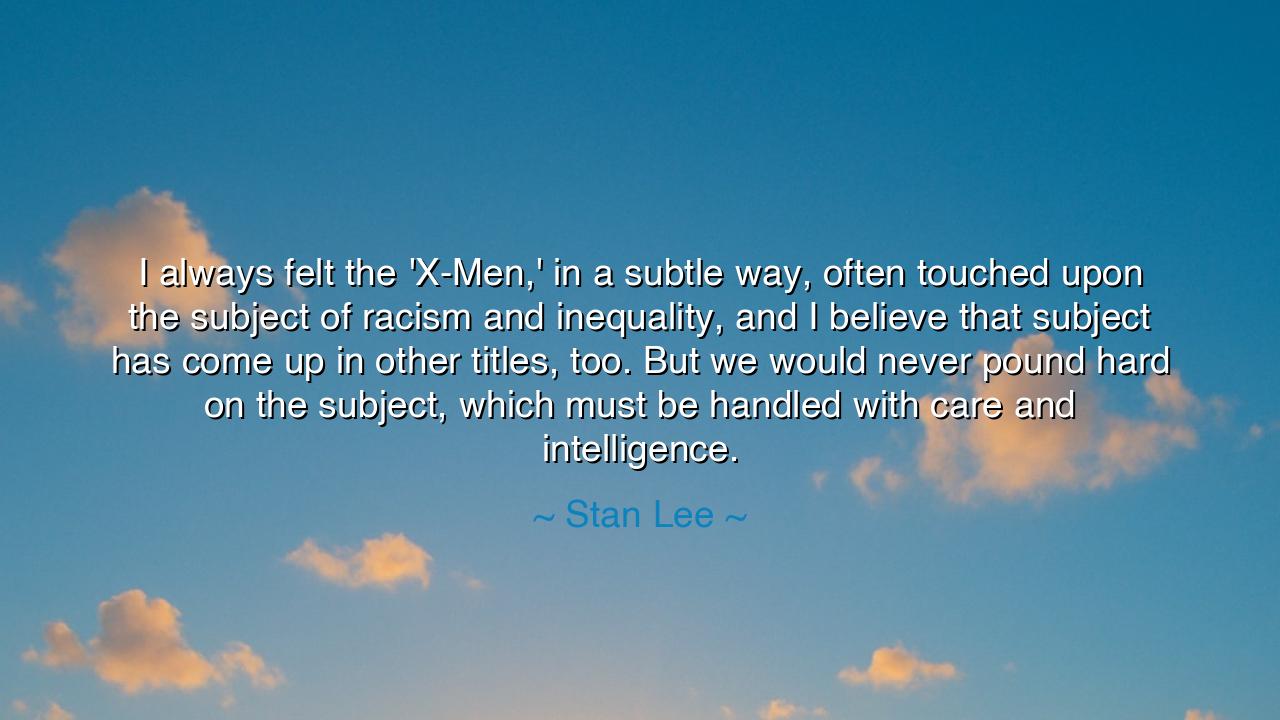
I always felt the 'X-Men,' in a subtle way, often touched upon
I always felt the 'X-Men,' in a subtle way, often touched upon the subject of racism and inequality, and I believe that subject has come up in other titles, too. But we would never pound hard on the subject, which must be handled with care and intelligence.






In this wise and deeply compassionate reflection, Stan Lee, the great storyteller and architect of modern mythology, speaks of his creation not merely as entertainment, but as a mirror of humanity: “I always felt the 'X-Men,' in a subtle way, often touched upon the subject of racism and inequality, and I believe that subject has come up in other titles, too. But we would never pound hard on the subject, which must be handled with care and intelligence.” These words, humble in tone yet vast in meaning, reveal the heart of a man who understood the true purpose of art — not to preach, but to awaken. Through superheroes, he explored the eternal struggle between fear and understanding, prejudice and compassion, division and unity. His was not the voice of condemnation, but of invitation — calling readers to reflect upon their world and see the humanity that binds them beneath every difference.
The origin of this quote lies in the birth of the X-Men, first published in 1963, during a time of immense social turbulence. America was standing at the crossroads of civil rights and conscience. Martin Luther King Jr. and Malcolm X walked the same earth then, one preaching peace, the other defiance — both demanding justice. In that era, Stan Lee and artist Jack Kirby created the X-Men: young mutants born with extraordinary gifts, yet feared and hated by the world they sought to protect. In their stories, Lee found a way to tell the truth that could not always be spoken — that those who are different, whether by race, faith, or origin, are often the first to be misunderstood. He wove into fantasy a parable of inequality, where the enemy was not evil itself, but ignorance.
To “touch upon” such a subject “with care and intelligence” is an art of its own. Lee understood that messages forced upon an audience harden the heart instead of opening it. Preaching divides, but story unites. The X-Men did not shout the word “racism,” yet every panel whispered it. The reader who saw mutants persecuted for being born different began to feel empathy — first for the fictional, then for the real. This was the genius of Stan Lee’s philosophy: that wisdom, like light, spreads most gently when diffused through imagination. He knew that the power of art lies not in accusation, but in recognition — in allowing others to discover truth for themselves, and in that discovery, to grow.
In many ways, the struggle of the mutants mirrors that of humankind throughout history. Consider the tale of Galileo Galilei, who was condemned for seeing the world differently — punished not for wickedness, but for vision. Or the persecution of those who, across ages and lands, have stood apart because of their color, belief, or birth. In each case, fear masked itself as righteousness, and the familiar rejected the unknown. The X-Men, though fictional, are born of that same story: beings judged not by their deeds, but by their nature. Through them, Stan Lee gave form to the voiceless and dignity to the despised. He transformed the comic book page into a stage upon which justice and prejudice danced in eternal combat.
And yet, he cautioned that such subjects must be handled “with care and intelligence.” For when the message overwhelms the story, the heart of the art is lost. Lee’s restraint was not weakness but wisdom. He knew that the deepest wounds of humanity cannot be healed by scolding, but by storytelling that touches the soul. His heroes were never flawless gods; they were outcasts, wanderers, and dreamers — mirrors of the reader’s own struggle to belong. In that subtlety lay his greatness: he did not tell us what to think; he showed us who we were.
The lesson of this quote reaches far beyond the realm of comics. It teaches us that truth, when delivered with compassion, pierces deeper than truth delivered with force. It reminds us to speak with empathy, especially when addressing the pains of division and inequality. Whether we are artists, teachers, leaders, or simply human beings in a divided world, we must learn to approach one another not with accusation, but with understanding. The voice that listens before it teaches, that seeks wisdom before victory, becomes the bridge over every barrier.
So, my child, remember this: when you seek to change hearts, do so with gentleness and clarity. Do not hammer your truth into others; light it like a torch and let them find warmth in its glow. Let your art, your words, and your actions be filled not with judgment, but with humanity. For the world does not need more noise — it needs meaning. And as Stan Lee showed through every hero he ever created, the most powerful stories are those that remind us that even in difference, we are one.
For in the end, his message endures: the greatest superpower of all is not strength, nor speed, nor brilliance — but empathy. And those who wield it, quietly and wisely, will always be the true heroes of the world.






AAdministratorAdministrator
Welcome, honored guests. Please leave a comment, we will respond soon